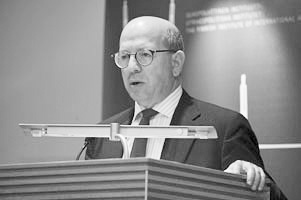
James Sherr: ‘Yanukovych
has miscalculated’
By Yuriy Onyshkiv
Interview excerpts from Kyiv Post,
Ukrainian President Viktor Yanukovych has moved the nation’s
foreign policy swiftly in the pro-Russian direction since his Feb. 25
inauguration. He’s criticized the Hero of Ukraine award that his
predecessor, Viktor Yushchenko, bestowed on early 20th century nationalist
leader Stepan Bandera. He’s signed the Kharkiv accords, letting the Russian
Black Sea Fleet stay in 
The breakneck pace has caught the West, which had
grown weary of
James Sherr, head of the Russian and Eurasian
program at London-based Chatham House, is a key Western expert on
KP: Were you surprised by the speed and scale of
Yanukovych’s move in his foreign policy towards
JS: “Once the law of March 9 passed [stating that a
coalition may consist not only of party factions, but also of individual
deputies], the ‘art of the possible’ changed in
KP: How much further do you think Yanukovych will
take
JS: “With his opening moves – with the Kharkiv
accords alone – Yanukovych has reversed the entire direction of
But Yanukovych has already thrown his strongest
cards away. First, he has conceded everything regarding the Black Sea Fleet.
Second, he secured none of the quid pro quo he sought over energy
(including the abandonment of the South Stream pipeline and a guarantee of
minimal Russian gas trans-shipments across
Third, he has widened the field of internal
opposition, alienating not only Tymoshenko’s most devoted supporters, but
those, like [former Chief of Staff in Yushchenko’s Administration,Viktor]
Baloha, who threw all of their efforts behind the formation of a centrist
coalition with him, which he, unceremoniously has spurned.
And fourth, having assured
The approach to the accords has been improvised;
everything has been done with breathtaking incompetence, belligerence and
haste. That includes the all too sudden geopolitical shift: the astonishing
brusque termination of intelligence collaboration with NATO, the de facto
(if still unacknowledged) halting of defence and security sector reform, the
return of the old guard to the Ministry of Defence, general staff and SBU
[Security Service of Ukraine], the carte blanche given to Russian
intelligence services, and most astonishingly, the preservation of all the
deficiencies of the 1997 Black Sea Fleet accords, now extended to 2042. That’s
an astonishingly cynical price to pay for what is likely to be a short-term
boost in economic performance and internal popularity.”
KP: The West, namely Brussels and Washington,
D.C., seems to be turning a blind eye to a lot of events in
JS: “The navety of Yanukovych and his partners is to
forget that for
First, let’s understand that the absence of
Western reaction thus far reflects a large degree of shock. Experts might have
understood what the March 9 coalition law and the new coalition meant. But
bureaucracies and the decision-makers of the EU, NATO and the
So, much as I lament it and condemn it,
They have
concluded, cynically but entirely rationally, that they should use this moment
to grab everything they can get. That’s not because they are confident in
themselves. Quite the opposite. They know that despite modest recovery from the
financial crisis, their underlying problems are serious. They have no clue how
to address their modernization agenda, to measure up to the performance,
adaptability and innovation of the BRIC [Brazil, Russia, India, China], and
that the various insurgencies in the North Caucasus are tantamount to having a
bit of Afghanistan in one’s backyard. Ironic, is it not, how the moments of
convenience coincide: How Yanukovych, for internal reasons, and the Moscow
tandem, for geopolitical reasons, seek to grab as much power as they can before
the window of opportunity closes.”
KP: Do you see
JS: “In the literal sense,
We can, and also must, engage the new authorities
in any dialogue open to us, with the aim of focusing their attention on the
implications and consequences of their actions. Let’s not exclude the
possibility that they will evolve and, in their own interests, seek to abandon
the basis of consultation, participation and even power.
If the opposition is to play this role, it will
have to renew itself. Until it comes to terms with what went wrong between 2005
and 2010, it won’t be able to renew itself.
I am confident of one thing. The more Ukrainians
know of
Kyiv Post staff writer Yuriy Onyshkiv can be
reached at onyshkiv@kyivpost.com
James Sherr